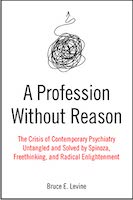The Systemic Crushing of Young Nonconformists and Anti-Authoritarians
“To be a hero,” says Philip Zimbardo in his talk The Psychology of Evil, “you have to learn to be a deviant, because you’re always going against the conformity of the group.” That’s true, and I think Zimbardo would agree that the heroism required to battle for liberty and justice in the face of tyranny […]
Why the Newest Psychiatric Diagnostic Bible Will Be a Boon for Big Pharma
After the American Psychiatric Association (APA) approved the latest version of its diagnostic bible, the DSM-5, psychiatrist Allen Frances, the former chair of the DSM-4 taskforce and currently professor emeritus at Duke, announced, “This is the saddest moment in my 45-year career of practicing, studying and teaching psychiatry” (“A Tense Compromise on Defining Disorders”). The […]
What Happened After a Nation Methodically Murdered Its Schizophrenics? Rethinking Mental Illness and Its Heritability
If a nation murdered and sterilized an estimated 73% to 100% of its diagnosed schizophrenics, yet a generation later that nation had a higher rate of incidence of new cases of schizophrenia than did surrounding nations, shouldn’t we have questions about the claim by the mental health establishment that schizophrenia is highly heritable? Moreover, since […]
How 7 Historic Figures Overcame Depression without Doctors
While Sylvia Plath and Ernest Hemingway received extensive medical treatment for depression but tragically committed suicide, other famously depressed people—including Abraham Lincoln, William James, Georgia O’Keeffe, Sigmund Freud, William Tecumseh Sherman, Franz Kafka, and the Buddha—have taken different paths. Did those luminaries who took alternative paths and recovered really have the symptoms of major depression, […]
Behavior Modification and an Authoritarian Society
The corporatization of society requires a population that accepts control by authorities, and so when psychologists and psychiatrists began providing techniques that could control people, the corporatocracy embraced mental health professionals.
Does TV Actually Brainwash Americans?
Historically, television viewing has been used by various authorities to quiet potentially disruptive people—from kids, to psychiatric inpatients, to prison inmates. In 1992, Newsweek (“Hooking Up at the Big House”) reported, “Faced with severe overcrowding and limited budgets for rehabilitation and counseling, more and more prison officials are using TV to keep inmates quiet.” Joe […]
How Psychologists Subvert Democratic Movements: A Talk at the 2012 Psychologists for Social Responsibility Conference
By the 1980s, as a clinical psychology graduate student, it had become apparent to me that the psychology profession was increasingly about meeting the needs of the “power structure” to maintain the status quo so as to gain social position, prestige, and other rewards for psychologists. The academic psychology that I entered as a psychology […]
To Vote or Not to Vote? Transcending the Wedge Issue That Divides Democracy Activists
Many nonvoting democracy activists argue that participating in U.S. national elections only maintains the illusion of democracy, and so voting can become a wedge issue that undermines solidarity among voting and nonvoting activists on democracy battlefields beyond electoral politics.
New Guide: A Sane Approach to Psychiatric Drugs
Millions of people believe that psychiatric medications have saved their lives, while millions of others report that their psychiatric medications were unhelpful or made things worse. All this can result in mutual disrespect for different choices. I can think of no better antidote for this polarization than the recently revised, second edition Harm Reduction Guide […]
Take a Pill, Kill Your Sex Drive? 6 Reasons Antidepressants Are Misnamed
Should a drug that produces sexual dysfunction for the majority of users and which doubles the risk of a suicide attempt be labeled as an antidepressant? No, argues a recent Scientifica article “Relabeling the Medications We Call Antidepressants.” The article’s authors, David Antonuccio, psychologist at the Department of Psychiatry and Behavioral Sciences, University of Nevada […]




